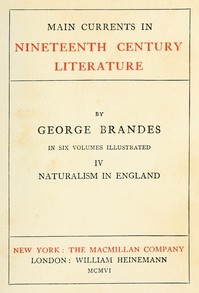Main Currents in Nineteenth Century Literature - 4. Naturalism in England
"Main Currents in Nineteenth Century Literature - 4. Naturalism in England" by George Brandes is a critical literary analysis written in the early 20th century. This work explores the emergence of Naturalism in English literature during the 19th century, discussing how this movement influenced various authors and literary works of the period. Brandes examines the transition from classical forms to a literature that emphasizes realism and the representation of nature and society,
reflecting the broader currents of political and social change. The opening of the narrative sets the stage for an in-depth exploration of the Naturalistic movement in England, highlighting the universal characteristics shared across European literature during this time. Brandes indicates that this literary shift arose partly as a reaction against the prevailing classical ideals influenced by the Enlightenment. He emphasizes how political events, such as the war with France and the social upheavals caused by the industrial revolution, contributed to a renewed focus on individual experience and the natural world. Notably, the text introduces key figures such as Wordsworth and Coleridge, who sought to rupture with the literary conventions of the 18th century, paving the way for a new embrace of nature and the ‘common’ subject in poetry, thereby establishing the foundations of Naturalism in English literature. (This is an automatically generated summary.)
Read or download for free
| How to read | Url | Size | |||
|---|---|---|---|---|---|
| Read now! | https://www.gutenberg.org/ebooks/47892.html.images | 881 kB | |||
| EPUB3 (E-readers incl. Send-to-Kindle) | https://www.gutenberg.org/ebooks/47892.epub3.images | 1.7 MB | |||
| EPUB (older E-readers) | https://www.gutenberg.org/ebooks/47892.epub.images | 1.8 MB | |||
| EPUB (no images, older E-readers) | https://www.gutenberg.org/ebooks/47892.epub.noimages | 408 kB | |||
| Kindle | https://www.gutenberg.org/ebooks/47892.kf8.images | 2.0 MB | |||
| older Kindles | https://www.gutenberg.org/ebooks/47892.kindle.images | 1.9 MB | |||
| Plain Text UTF-8 | https://www.gutenberg.org/ebooks/47892.txt.utf-8 | 778 kB | |||
| Download HTML (zip) | https://www.gutenberg.org/cache/epub/47892/pg47892-h.zip | 1.7 MB | |||
| There may be more files related to this item. | |||||
Similar Books
About this eBook
| Author | Brandes, Georg, 1842-1927 |
|---|---|
| Translator | Morison, Mary |
| Translator | White, Diana |
| Title | Main Currents in Nineteenth Century Literature - 4. Naturalism in England |
| Alternate Title | Main Currents in 19th Century Literature - 4. Naturalism in England |
| Note | Reading ease score: 61.4 (8th & 9th grade). Neither easy nor difficult to read. |
| Contents | Common characteristics of the period -- National characteristics -- The political background -- The beginnings of Naturalism -- Strength and sincerity of the love of nature -- Rural life and its poetry -- Naturalistic Romanticism -- The Lake School's conception of liberty -- The Lake School's Oriental Romanticism -- Historical Naturalism -- All-embracing sensuousness -- The poetry of Irish opposition and revolt -- Erotic lyric poetry -- The British spirit of freedom -- Republican humanism -- Radical Naturalism -- Byron: the passionate personality -- Byron: his self-absorption -- Byron: the revolutionary spirit -- Comic and tragic realism -- Culmination of Naturalism -- Byron's death -- Conclusion. |
| Credits | Produced by Jens Guld and Marc D'Hooghe (Images generously made available by the Internet Archive.) |
| Language | English |
| LoC Class | PN: Language and Literatures: Literature: General, Criticism, Collections |
| Subject | Literature, Modern -- 19th century -- History and criticism |
| Subject | Naturalism in literature |
| Subject | Romanticism |
| Category | Text |
| EBook-No. | 47892 |
| Release Date | Jan 6, 2015 |
| Most Recently Updated | Apr 4, 2024 |
| Copyright Status | Public domain in the USA. |
| Downloads | 561 downloads in the last 30 days. |
| Project Gutenberg eBooks are always free! | |


